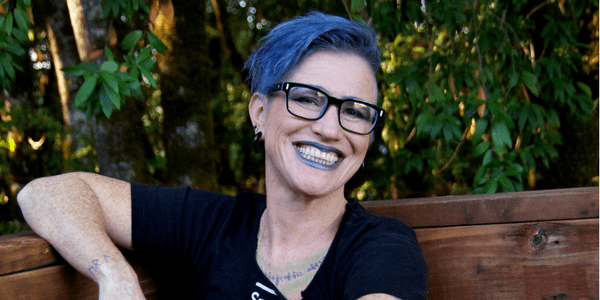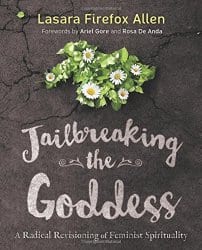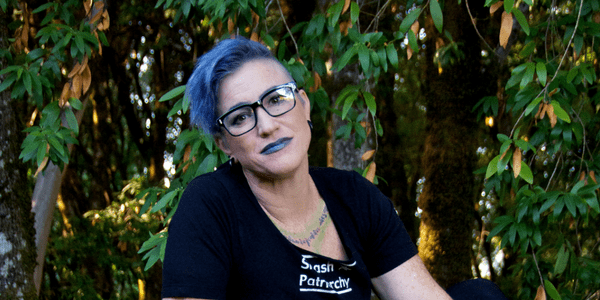 Lasara Firefox Allen is a radical feminist, anarchist and punkrocker whose book, Jailbreaking the Goddess, pushes the traditional threefold model of the Goddess into powerful new territory. We sat down with her to discuss her vision of the feminal divine and the role it can play in activism in a divisive climate.
Lasara Firefox Allen is a radical feminist, anarchist and punkrocker whose book, Jailbreaking the Goddess, pushes the traditional threefold model of the Goddess into powerful new territory. We sat down with her to discuss her vision of the feminal divine and the role it can play in activism in a divisive climate.
Sharon Woods: I wanted to start off by asking about the title, Jailbreaking the Goddess. I love the title, but what was the thinking behind that? What does it mean to “jailbreak” the goddess and how do we achieve it?
 Lasara Firefox Allen: Initially the book was titled The Fivefold Goddess, because when I wrote the proposal for Llewellyn that was the main focal point. Then when I got my first draft to my editor, she was like, “it has grown so far beyond the five-fold model. It’s become a bigger concept and we need a bigger title for it.
Lasara Firefox Allen: Initially the book was titled The Fivefold Goddess, because when I wrote the proposal for Llewellyn that was the main focal point. Then when I got my first draft to my editor, she was like, “it has grown so far beyond the five-fold model. It’s become a bigger concept and we need a bigger title for it.
I’m an anarchist, and I had just been to an anarchist book fair, where I’d seen the word “jailbreaking” applied to a bunch of things. I was like, “That’s it! Jailbreaking the Goddess!” But I was kind of joking. I didn’t think Llewellyn would go for such a radical title. But my editor loved it, she took it to the marketing committee and they decided to go with it. ((See Marjorie Jensen’s review of Jailbreaking the Goddess.))
After they chose it, I had a moment of panic, but I’m very happy with it now. As far as what it means, the idea is to break our concepts out of the rigid confines that we’ve given them. I think that deity is beyond our imprisonment, you can’t imprison the spirit. In a sense what we’re jailbreaking with this book is really our concepts of the divine. We’re jailbreaking our own consciousness.
That’s a great concept. The fivefold goddess is obviously the central portion of the book, so when was when you first felt the need to expand on the traditional pagan threefold model?
I’ve been working with the concept for quite a while now. I don’t know how long, but I’ve been working with the concept as actual applied ritualization for probably five years. I initially was working with adding warrior and queen, so it was Maiden, Warrior, Mother, Queen, Crone. Then I realized, one: as an anti-interventionist I’m not pro-war, so creating more divine archetypes around war is not necessarily what I want to be doing. And as an anarchist, monarchies also hold certain echoes that I don’t think are helpful to our process at this point in time as spiritual people seeking liberation.
The other thing was, in seeking for this new model, some of the input that lead me to this point was people feeling alienated by the centralization of the mother, as mother as synonymous with woman and that our maturity is in motherhood, etc. For many of us, whether we have children or not, doesn’t feel accurate. So, it felt like I was trying to make sense of something that didn’t make sense. It felt better to me to completely move into new territory.
For me deity is very malleable. I’m an anarchist and a punkrocker, I don’t have issues with making stuff up from scratch. Others who have more of a rigid sense of spiritual tradition have a harder time with it, but my personal inclinations and biases made it easier for me to take it to the cutting board and really examine what needs to be spoken here.
What your fivefold model does encompass is archetypes who do things and who are active. Like, Potens, the advocate or Creatrix who creates. There’s so much more flexibility to see yourself in that. It’s much more accessible in that respect. These goddesses act.
Yes. Definitely. They act and that is one of the central elements: to see women for what they do and what they are, rather than what they give. The whole idea of the feminal divine being defined by her productivity is a patriarchal model. The idea that a woman needs to provide heirs to the patriarchy to fulfill her purpose is really outmoded and patriarchally biased.

Do you have any advice for people who might be struggling with that part of the reclaiming process?
Definitely. One thing is that I’m not telling people that they can’t work with the threefold model any more.
The tradition I came up in has a lot of the threefold model and I’m not saying that I’ll never work with it again. The threefold model can be nested into the fivefold model, it can become Potens, Creatrix, Sapientia; or Femella, Creatrix, Antiqua, depending on your tradition’s format with the three. It just depends on your own relationship with Maiden, Mother, Crone where in the spectrum you find them.
I’m not trying to take anything away from anyone. Just trying to offer a model with more flexibility and inclusion.
You have a chapter dedicated to magical conspiracy, which is a way to consciously collaborate with other people and work towards a common goal. But I think what’s even more radical than that is the suggestion that we can have a co-conspirator relationship with a face of the goddess. Can you speak a bit more about what that looks like? I think it might be unfamiliar to a lot of people.
Definitely! The question I pose in that chapter around creating a co-conspiratorial relationship with deity is that, again, I bring it back to how I do relationships with people.
As an anarchist, I don’t buy into hierarchical relationships with people, so why would I buy into a hierarchical relationship with a deity? My relationships with deity are relationships, they’re relational. I’m looking for feedback, resonance and communication from whichever entity or deity I’m working with.
Some deities are not going to be down for a relationship of equals, or seeking toward how we can be of service to one another. But I am less interested in working with deities that are solidly hierarchical because it doesn’t work within my personal framework.
You seem very interested in language and how we use it in the dominant culture, but also in how we express ourselves as women and with the divine. At one point you discuss crafting language to create the equality we want to exist and the importance of shifting pronouns from an I and You model to an Us and We model. What do you think a world-centred in that model would look like?
This is a touchy subject because Western culture is so self-affirming and radically individualist, which is how we end up in positions like we’re in today. In a culture where we think of the wider implications of personal actions, that outcome wouldn’t happen because we’d be looking at the whole picture.
Thinking from the collective, rather than the personal — I’m not saying never think from the personal, there has to be a balance. I’ve spent some time in other cultures where the where the collective is the primary point of reference and that can also have its own drawbacks, there’s a balance to be found between the two.
What do you think it would take for us to get to a more collectivist mindset from where we are now?
I think that a lot of what I talk about in the book is the idea of coming to the table and asking, “What do we all need? What do we all want?” We don’t even need to have collective agreement on what is needed, but we need to learn to look at someone else’s needs and value their needs as valid as our own. So, we don’t define the struggle for everyone and then expect them to co-sign it. I think that is one of the main failing points of white feminism. It actively tries to define other people’s realities. How can we stop doing that is the question. How can we move to a collectivist model for feminism, even?
Well, feminism can look very different depending on where it’s situated. I took a course on eastern spirituality in university, which focused on Hinduism, and that was something the professor brought up: in India feminism does centre more on the family and the household, which seems to reflect a more collectivist culture than ours.
Right. Religion and social structure need to be taken into account. So, does class, ethnicity, traditions, family values… all of it. We can’t do that when we’re blinded by our own individualism.
I think one of my favourite metaphors from Jailbreaking the Goddess when talking about language was that we have to draw it in from the edges to include everybody. I love that image.
Thank you!
Given recent world events, I think it’s probably more important than ever to create inclusive and welcoming communities spiritually and in our secular lives. How can we best continue to support and advocate for sisters and brothers who might be coming from marginalized groups?
Again, look at what is available in your community, show up for what’s already happening, and if what you feel called to offer is not happening where you are, consider if you are willing to help start that.
Are you willing to create space for people to gather or open your home? If you can’t open your home, can you find another location to set up time and space for people to come together, even if it’s for something as simple as sharing company?
It doesn’t have to be overt activism for it to be community-building. That takes a lot of different forms, some of the ideas are things like, if you are a parent with young children who needs childcare, you know other parents are out there need the same service. Can you create a childcare timeshare or trade situation? If you don’t have children, are you willing to take care of other people’s children so they can have free time to do self-care or work?
How are we willing to show up to our communities. Are you willing to do community gardening or help with education around anti-racism? What is your passion and what do you see a need for? How can you help manifest that?

In your acknowledgements section you mention some of the musical artists you listen to while you were writing the book. How did music influence the creative process around the book and do you have playlists for each the goddesses?
I do not have playlists for each of the goddesses, but people who have done the initiation cycle with me have created their own playlists, so that’s kind of fun.
I use music to increased productivity when I’m on deadline. I barely ever use music in my day to day life. I like silence a lot, it’s my favourite thing. But I use music when I need to stay focused and driven, so I listen to a lot of film scores and climatic, driving action-oriented music.
The Transformers soundtrack was one of my favourites for writing the book. I just have a writing playlist of songs that are just instrumental.
Do you have any other projects that you’re working on that you can talk about right now?
I have so many projects that I’m working on!
I have two potential projects coming into being, one is called the Feminist Tarot, which is slow going, but I’m working with a woman in New York who is the artist for the project. That will be a functioning tarot deck, but it also will be a history of intersectional feminism. The trumps will be actual people and the suits will be functions of activism.
We are working on that being a thing that is out in the world someday, we don’t know when. Before I wrote Jailbreaking the Goddess, I wrote another book that was similar. It’s a feminist book with no spiritual content. After Jailbreaking had been out for a while I was looking through my files and I ended up opening that file and looking at it. It’s still really good, and it’s being looked at by a publisher right now.
Is there anything else you’d like to mention before we wrap this up?
Yeah! Two things! One, I have the online initiation cycle, which is a seven-month initiation cycle that takes place online. I’ve had people all over the world involved in the previous iterations. That’s starting in February 2017.
Then, I have an in-person retreat happening in Northern California in the beginning of June 2017. So folks should definitely go to my website, and see what’s there.
At my website, lasarafirefoxallen.com, you can also go to the Jailbreaking the Goddess menu item, there’s a bunch of interactive stuff, like a quiz for which of the five goddesses is your dominant archetype in that moment, and get on my mailing list!








